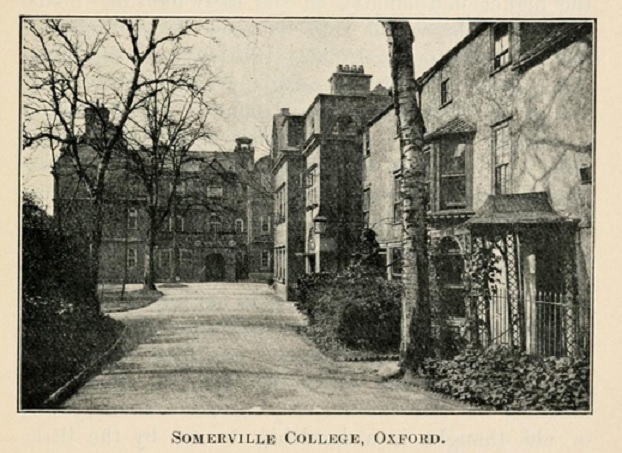
Named for Mary Somerville.
Blackheath Park, July 12th, 1869.
To Mrs. Somerville.
DEAR MADAM,
Such a letter as yours is a sufficient reward for the trouble of writing the little book. I could have desired no better proof that it was adapted to its purpose than such an encouraging opinion from you. I thank you heartily for taking the trouble to express, in such kind terms, your approbation of the book, the approbation of one who has rendered such inestimable service to the cause of women by affording in her own person so high an example of their intellectual capabilities, and, finally, by giving to the protest in the great Petition of last year the weight and importance derived from the signature which headed it.
I am,
Dear Madam,
Most sincerely and respectfully yours,
JOHN STUART MILL

So, who was Mrs. Somerville?

MARY SOMERVILLE ACCORDING TO MARIA EDGEWORTH:
Beechwood Park, January 17th, 1822.
We have spent two days pleasantly here with Dr. Wollaston, our own dear friend Mrs. Marcet, and the Somervilles. Mrs. Somerville is the lady who, Laplace says, is the only woman who understands his works. She draws beautifully, and while her head is among the stars her feet are firm upon the earth.
Mrs. Somerville is little, slightly made, fairish hair, pink colour, small, grey, round, intelligent, smiling eyes, very pleasing countenance, remarkably soft voice, strong but well-bred Scotch accent ; timid --- not disqualifying timid, but naturally modest, yet with a degree of self-possession through it which prevents her being in the least awkward, and gives her all the advantage of her understanding, at the same time that it adds a prepossessing charm to her manner and takes off all dread of her superior scientific learning.

MARY SOMERVILLE REMEMBERED BY HER DAUGHTER MARTHA:
My mother had a singular power of abstraction. When occupied with some difficult problem, or even a train of thought which deeply interested her, she lost all consciousness of what went on around her, and became so entirely absorbed that any amount of talking, or even practising scales and solfeggi, went on without in the least disturbing her. Sometimes a song or a strain of melody would recall her to a sense of the present, for she was passionately fond of music.
A curious instance of this peculiarity of hers occurred at Borne, when a large party were assembled to listen to a celebrated improvisatrice. My mother was placed in the front row, close to the poetess, who, for several stanzas, adhered strictly to the subject which had been given to her. What it was I do not recollect, except that it had no connection with what followed.
All at once, as if by a sudden inspiration, the lady turned her eyes full upon my mother, and with true Italian vehemence and in the full musical accents of Rome, poured forth stanza after stanza of the most eloquent panegyric upon her talents and virtues, extolling them and her to the skies. Throughout the whole of this scene, which lasted a considerable time, my mother remained calm and unmoved, never changing countenance, which surprised not only the persons present but ourselves, as we well knew how much she disliked any display or being brought forward in public. The truth was, that after listening for a while to the improvising, a thought struck her connected with some subject she was engaged in writing upon at the time and so entirely absorbed her that she heard not a word of all that had been declaimed in her praise, and was not a little surprised and confused when she was complimented on it.
I call this, advisedly, a power of hers, for although it occasionally led her into strange positions, such as the one above mentioned, it rendered her entirely independent of outward circumstances, nor did she require to isolate herself from the family circle in order to pursue her studies. I have already mentioned that when we were very young she taught us herself for a few hours daily ; when our lessons were over we always remained in the room with her, learning grammar, arithmetic, or some such plague of childhood.
Any one who has plunged into the mazes of the higher branches of mathematics or other abstruse science, would probably feel no slight degree of irritation on being interrupted at a critical moment when the solution was almost within his grasp, by some childish question about tense or gender, or how much seven times seven made. My mother was never impatient, but explained our little difficulties quickly and kindly, and returned calmly to her own profound thoughts. Yet on occasion she could show both irritation and impatience when we were stupid or inattentive, neither of which she could stand.
With her clear mind she darted at the solution, sometimes forgetting that we had to toil after her laboriously step by step. I well remember her slender white hand pointing impatiently to the book or slate: "Don't you see it? there is no difficulty in it, it is quite clear." Things were so clear to her !
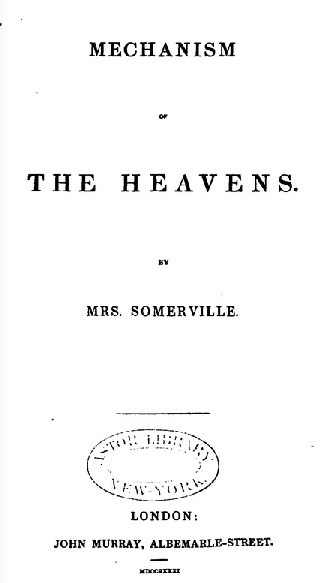
MARY SOMERVILLE GOES TO PARIS (in her own words)
I was astonished at the success of my book ; all the reviews of it were highly favourable ; I received letters of congratulation from many men of science. I was elected an honorary member of the Royal Astronomical Society at the same time as Miss Caroline Herschel. To be associated with so distinguished an astronomer was in itself an honour ...
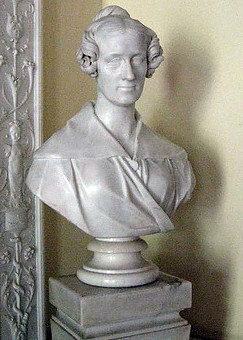
Mary Somerville by Chantrey
Photograph © Vassar College [Vassar Encyclopedia]
It was unanimously voted by the Royal Society of London, that my bust should be placed in their great Hall, and Chantrey was chosen as the sculptor. Soon after it was finished, Mr. Potter, a great ship-builder at Liverpool, who had just completed a fine vessel intended for the China and India trade, wrote to my friend, Sir Francis Beaufort, hydrographer of the Royal Navy, asking him if I would give him permission to call her the "Mary Somerville" and to have a copy of my bust for her figure-head. I was much gratified with this, as might be expected. The "Mary Somerville" sailed, but was never heard of again ; it was supposed she had foundered during a typhoon in the China sea.
I was elected an honorary member of the Royal Academy at Dublin, of the Bristol Philosophical Institution, and of the Société de Physique et d'Histoire Naturelle of Geneva, which was announced to me by a very gratifying letter from Professor Prevost.
Our relations and others who had so severely criticized and ridiculed me, astonished at my success, were now loud in my praise. The warmth with which Somerville entered into my success deeply affected me ; for not one [husband] in ten thousand would have rejoiced at it as he did , but he was of a generous nature, far above jealousy, and he continued through life to take the kindest interest in all I did ...
My health was never good at Chelsea, and as I had been working too hard, I became so ill, that change of air and scene were thought absolutely necessary for me. We went accordingly to Paris ; partly, because it was near home, as Somerville could not remain long with us at a time, and, partly, because we thought it a good opportunity to give masters to the girls, which we could not afford to do in London.
When we arrived, I was so weak, that I always remained in bed writing till one o'clock, and then, either went to sit in the Tuileries gardens, or else received visits. All my old friends came to see me, Arago, the first.

Medallion by Pierre Jean David d'Angers [Metropolitan Museum of Art]
He was more engaged in politics than science, and as party spirit ran very high at that time, he said he would send tickets of admission to the Chambers every time there was likely to be an orage. When I told him what I was writing, he gave me some interesting memoirs, and lent me a mass of manuscripts, with leave to make extracts, which were very useful to me.

General de La Fayette came to town on purpose to invite Somerville and me to visit him at La Grange, where we found him living like a patriarch, surrounded by his family to the fourth generation. He was mild, highly distinguished, and noble in his manners ; his conversation was exceedingly interesting, as he readily spoke of the Revolution in which he had taken so active a part. Among other anecdotes, he mentioned, that he had sent the principal key of the Bastile to General Washington, who kept it under a glass case.
He was much interested to hear that I could, in some degree, claim a kind of relationship with Washington, whose mother was a Fairfax. Baron Fairfax, the head of the family, being settled in America, had joined the independent party at the Revolution.
The two daughters of La Fayette, who had been in prison with him at Olmütz, were keen politicians, and discussed points with a warmth of gesticulation which amused Somerville and me, accustomed to our cold still manners ...

... The table was surrounded by savants, who complimented me on the Mechanism of the Heavens. I sat next M. Poisson, who advised me in the strongest manner to write a second volume, so as to complete the account of La Place's works ...

We had a long visit from M. Biot, who seemed really glad to renew our old friendship. He was making experiments on light, though much out of health ; but when we dined with him and Madame Biot, he forgot for the time his bad health, and resumed his former gaiety. They made us promise to visit them at their country-house when we returned to England, as it lay on our road.

Chez Laplace, Arcœuil
To my infinite regret, La Place had been dead some time -- La Place, and all the great mathematicians of that period, had scarcely passed away when the more powerful Quaternion system began to dawn -- but the Marquise was still at Arcœuil, and we went to see her. She received us with the greatest warmth, and devoted herself to us the whole time we were in Paris.
As soon as she came to town, we went to make a morning visit ; it was past five o'clock ; we were shown into a beautiful drawing-room, and the man-servant, without knocking at the door, went into the room which was adjacent, and we heard her call out, "J'irai la voir ! j'irai la voir !" and when the man-servant came out, he said, "Madame est désolée, mais elle est en chemise."
Madame de La Place was exceedingly agreeable, the life of every party, with her cheerful gay manner. She was in great favour with the Royal Family, and was always welcome when she went to visit them in an evening. She received once a week, and her grand-daughter, only nineteen, lovely and graceful, was an ornament to her parties. She was already married to M. de Colbert, whose father fell at Corunna.

Medallion by Pierre Jean David d'Angers [Metropolitan Museum of Art]
Monsieur and Madame Gay-Lussac lived in the Jardin des Plantes. Madame was only twenty-one, exceedingly pretty, and well-educated; she read English and German, painted prettily, and was a musician. She told me it had been computed, that if all the property in France were equally divided among the population, each person would have 150 francs a-year, or four sous per day ; so that if anyone should spend eight sous a-day, some other person would starve.
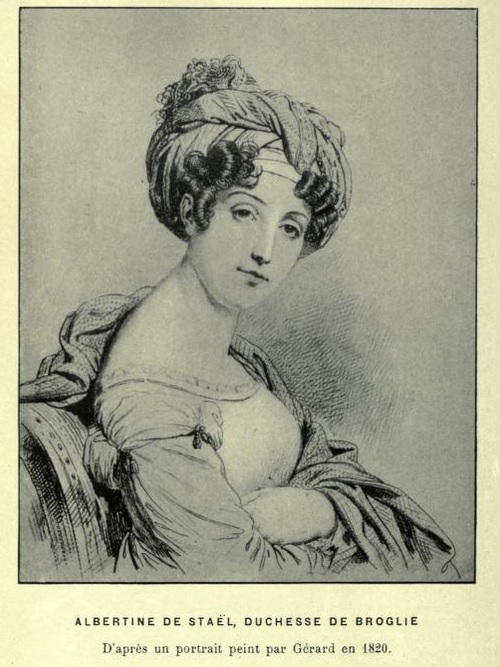
The Duchesse de Broglie, Madame de Staël's daughter, called, and invited us to her receptions, which were the most brilliant in Paris. Every person of distinction was there, French or foreign, generally four or five men to one woman. The Duchess was a charming woman, both handsome and amiable, and received with much grace. The Duke was, then, Minister for Foreign Affairs. They were remarkable for their domestic virtues, as well as for high intellectual cultivation. The part the Duke took in politics is so well known, that I need not allude to it here.

At some of these parties I met with Madame Charles Dupin, whom I liked much. When I went to return her visit, she received us in her bed-room. She was a fashionable and rather elegant woman, with perfect manners. She invited us to dinner to meet her brother-in-law, the President of the Chamber of Deputies. He was animated and witty, very fat, and more ugly than his brother, but both were clever and agreeable. The President invited me to a very brilliant ball he gave, but as it was on a Sunday I could not accept the invitation.

Painting by Jacques-Louis David [Metropolitan Museum of Art]
We went one evening with Madame Charles Dupin to be introduced to Madame de Rumford. Her first husband, Lavoisier, the chemist, had been guillotined at the Revolution, and she was now a widow, but had lived long separated from her second husband [the American-born physicist and inventor Lord Rumford]. She was enormously rich, and had a magnificent palace, garden, and conservatory, in which she gave balls and concerts. At all the evening parties in Paris the best bed-room was lighted up for reception like the other rooms. Madame de Rumford was capricious and ill-tempered ; however, she received me very well, and invited me to meet a very large party at dinner.
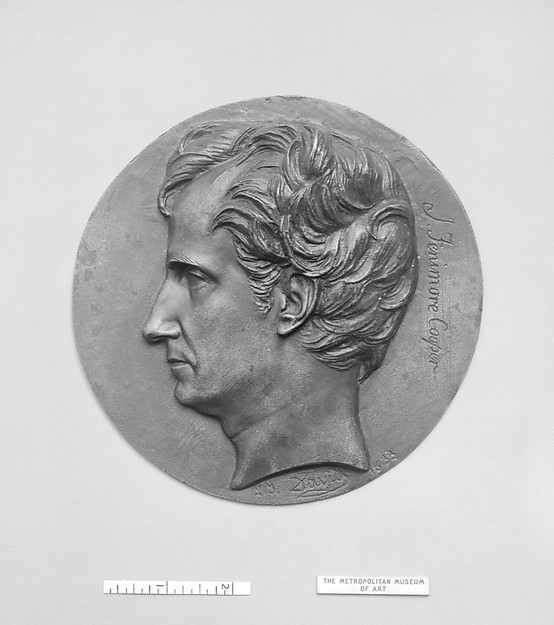
Medallion by Pierre Jean David d'Angers [Metropolitan Museum of Art]
Mr. Fenimore Cooper, the American novelist, with his wife and daughter, were among the guests. I found him extremely amiable and agreeable, which surprised me, for when I knew him in England he was so touchy that it was difficult to converse with him without giving him offence. He was introduced to Sir Walter Scott by Sir James Mackintosh, who said, in presenting him, "Mr. Cooper, allow me to introduce you to your great forefather in the art of fiction" ; "Sir," said Cooper, with great asperity, "I have no forefather." Now, though his manners were rough, they were quite changed. We saw a great deal of him, and I was frequently in his house, and found him perfectly liberal; so much so, that he told us the faults of his country with the greatest frankness, yet he was the champion of America, and hated England.
None were kinder to us than Lord and Lady Granville. Lady Granville invited us to all her parties ; and when Somerville was obliged to return to England, she assured him that in case of any disturbance, we should find a refuge in the Embassy.
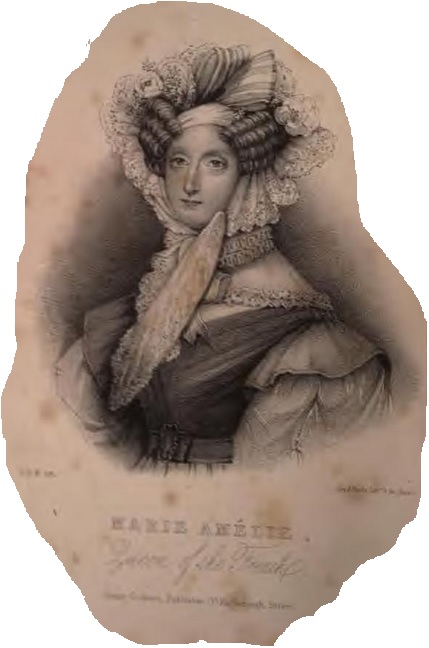
I went to some balls at the Tuileries with Madame de Lafayette-Lasteyrie and her sister. The Queen Amelie was tall, thin, and very fair, not pretty, but infinitely more regal than Adelaide, Queen of England, at that time. The Royal Family used to walk about in the streets of Paris without any attendants.

Admiral Smith by Louis-Marie Autissier
[ Royal Collection Trust]
Sir Sydney Smith was still in Paris trying to renew the order of the Knights Templars ... Sir Sydney was quite covered with stars and crosses, and I was amused with the way he threw his cloak back to display them as he handed me to the carriage.

I met with Prince Kosloffsky everywhere ; he was the fattest man I ever saw, a perfect Falstaff. However, his intellect was not smothered, for he would sit an hour with me talking about mathematics, astronomy, philosophy, and what not. He was banished from Russia, and as he had been speaking imprudently about politics in Paris, he was ordered to go elsewhere ; still, he lingered on, and was with me one morning when Pozzo di Borgo, the Russian Ambassador called. Pozzo di Borgo said to me, " Are you aware that Prince Kosloffsky has left Paris ?" "Oh yes," I said, " I regret it much." He took the hint, and went away directly.

I had been hitherto entirely among the Liberal set. How it came that I was invited to dine with M. Héricourt de Thury, I do not remember. M. de Thury was simple in his manners, and full of information ; he had been Director of the Mines under Napoleon, and had charge of the Public Buildings under Louis XVIII. and Charles X., but resigned his charges at the Revolution of July.

At this time the Duchesse de Berry was confined in the citadel of Blaye. She had a strong party in Paris, who furiously resented the treatment she met with. M. de Thury was a moderate Legitimiste, but Madame was ultra. When I happened to mention that we had been staying with Lafayette, at La Grange, she was horrified, and begged of me not to talk politics, or mention where we had been, or else some of her guests would leave the room.
The ladies of that party would not dance or go to any gay party ; they had a part of the theatre reserved for themselves ; they wore high dark dresses with long sleeves, called Robes de Résistance, and even the Legitimiste newspapers appeared with black edges. They criticised those who gave balls, and Lady Granville herself did not escape their censure.
The marriage of the Duchesse de Berry to the Marchese Lucchesi Palli made an immense sensation ; it was discussed in the salons in a truly French manner ; it was talked of in the streets ; the Robes de Résistance were no longer worn, and the Legitimiste newspapers went out of mourning.
All parties criticised the British Administration in Ireland. A lady sitting by me at a party said, "No wonder so many English prefer France to so odious a country as England, where the people are oppressed, and even cabbages are raised in hot-beds." I laughed, and said, "I like England very well, for all that." An old gentleman, who was standing near us, said, "Whatever terms two countries may be on, it behoves us individuals to observe good manners ;" and when I went away, this gentleman handed me to the carriage, though I had never seen him before.
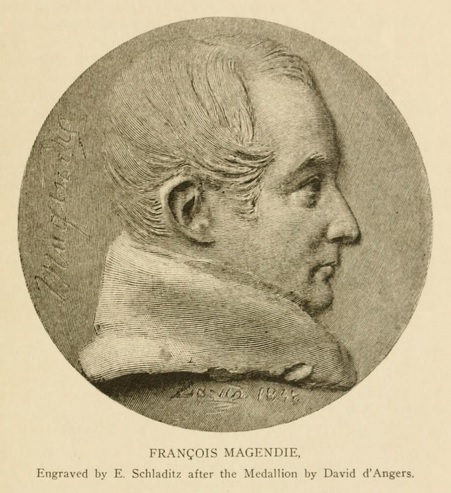
The Marquise de La Place was commissioned by Dr. Magendie to invite me to meet her and Madame Gay-Lussac at dinner. I was very unwilling to go ; for I detested the man for his wanton cruelties, but I found I could not refuse on account of these ladies. There was a large party of savants, agreeable and gentlemanly; but Magendie himself had the coarsest manners ; his conversation was horridly professional ; many things were said and subjects discussed not fit for women to hear.
What a contrast the refined and amiable Sir Charles Bell formed with Magendie ! Magendie and the French school of anatomy made themselves odious by their cruelty, and failed to prove the true anatomy of the brain and nerves, while Sir Charles Bell did succeed, and thus made one of the greatest physiological discoveries of the age without torturing animals, which his gentle and kindly nature abhorred ...
[Mary Somerville loved animals, and one of her closest friends, the Irish suffragette Frances Power Cobbe, was a founder of the animal-rights movement. Many other British mathematicians and physicists of her generation were also horrified by the gruesome experiments of the Continental physiologists and their young English disciples; vivisection was a major factor in the older natural-philosophers' rejection of the new "biology". Although Mrs. Somerville -- an evolutionist even before Darwin, an avowed internationalist, and a champion of the harmony between experiment and abstract theory -- shared neither the religious views nor the anti-empirical biases of her more insular colleagues, she felt the same revulsion as they for "knowledge obtained by torture". She was actively involved in this struggle all of her life; as an nonagenarian pensioner in Italy, she helped found the Società Protettrice degli Animali.]

Mary Somerville: Medallion by Pierre Jean David d'Angers [Metropolitan Museum of Art]
M. Arago told me that David, the sculptor, wished to make a medallion of me ; so he came and sat an hour with me, and pleased me by his intelligent conversation and his enthusiasm for art. A day was fixed, and he took my profile on slate with pink wax, in a wonderfully short time. He made me a present of a medallion in bronze, nicely framed, and two plaster casts for my daughters ...

... Baron Louis invited me to spend a day with him and his niece, Mademoiselle de Rigny, at his country house, not far from Paris. I went with Madame de la Place, and we set out early, to be in time for breakfast. The road lay through the Forest of Vincennes. The Baron's park, which was close to the village of Petit-Brie, was very large, and richly wooded ; there were gardens, hot-houses, and all the luxuries of an English nobleman's residence. The house was handsome, with a magnificent library; I remarked on the table the last numbers of the "Edinburgh" and "Quarterly" Reviews.
Both the Baron and his niece were simple and kind. I was greatly taken with both ; the Baron had all the quiet elegance of the old school, and his niece had great learning and the manners of a woman of fashion. She lived in perfect retirement, having suffered much in the time of the Revolution. They had both eventful lives ; for Baron Louis (who had been in orders) and Talleyrand officiated at the Champs de Mars when Louis the Sixteenth took the oath to maintain the constitution ...

Champ de Mars, 1790 July 14
After spending a most delightful and interesting day, we drove to Paris in bright moonlight ...
MANY YEARS LATER:
Mary Somerville Describes Her Last Major Investigation
[1872 April 26]
Vesuvius was now in the fiercest eruption, such as has not occurred in the memory of this generation, lava overflowing the principal crater and running in all directions. The fiery glow of lava is not very visible by daylight ; smoke and steam is sent off which rises white as snow, or rather as frosted silver, and the mouth of the great crater was white with the lava pouring over it. New craters had burst out the preceding night, at the very time I was admiring the beauty of the eruption, little dreaming that, of many people who had gone up that night to the Atrio del Cavallo to see the lava (as my daughters had done repeatedly and especially during the great eruption of 1868), some forty or fifty had been on the very spot where the new crater burst out, and perished, scorched to death by the fiery vapours which eddied from the fearful chasm. Some were rescued who had been less near to the chasm, but of these none eventually recovered.
Behind the cone rose an immense column of dense black smoke to more than four times the height of the mountain, and spread out at the summit horizontally, like a pine tree, above the silvery stream which poured forth in volumes. There were constant bursts of fiery projectiles, shooting to an immense height into the black column of smoke, and tinging it with a lurid red colour. The fearful roaring and thundering never ceased for one moment, and the house shook with the concussion of the air.
One stream of lava flowed towards Torre del Greco, but luckily stopped before it reached the cultivated fields ; others, and the most dangerous ones, since some of them came from the new craters, poured down the Atrio del Cavallo, and dividing before reaching the Observatory flowed to the right and to the left --- the stream which flowed to the north very soon reached the plain, and before night came on had partially destroyed the small town of Massa di Somma.

One of the peculiarities of this eruption was the great fluidity of the lava ; another was the never-ceasing thundering of the mountain. During that day we observed several violent explosions in the great stream of lava : we thought from the enormous volumes of black smoke emitted on these occasions that new craters had burst out --- some below the level of the Observatory; but that can hardly have been the case. My daughters at night drove to Portici, and went up to the top of a house, where the noise seems to have been appalling ; but they told me they did not gain anything by going to Portici, nor did they see the eruption better than I did who remained at Santa Lucia, for you get too much below the mountain on going near.
On Sunday, 28th, I was surprised at the extreme darkness, and on looking out of window saw men walking with umbrellas ; Vesuvius was emitting such an enormous quantity of ashes, or rather fine black sand, that neither land, sea, nor sky was visible ; the fall was a little less dense during the day, but at night it was worse than ever. Strangers seemed to be more alarmed at this than at the eruption, and certainly the constant loud roaring of Vesuvius was appalling enough amidst the darkness and gloom of the falling ashes. The railroad was crowded with both natives and foreigners, escaping ; on the other hand, crowds came from Rome to see the eruption. We were not at all afraid, for we considered that the danger was past when so great an eruption had acted as a kind of safety-valve to the pent-up vapours ...
Vesuvius was involved in vapour and ashes till far on in May, and one afternoon at sunset, when all below was in shade, and only a few silvery threads of steam were visible, a column of the most beautiful crimson colour rose from the crater, and floated in the air. Many of the small craters still smoked, one quite at the base of the cone, which is a good deal changed --- it is lower, the small northern cone has disappeared, and part of the walls of the crater have fallen in, and there is a fissure in them through which smoke or vapour is occasionally emitted.
On the 1st June we returned to Sorrento, this time to a pretty and cheerful apartment close to the sea, where I led very much the same pleasant life as before ...
It is a curious fact that some plants which did not grow in this part of the country a few years ago are now quite common. Amongst others, the Trachelium cœruleum, a pretty wall-plant, native of Calabria, and formerly unknown here, now clothes many an old wall near Naples ...

Trachelium cæruleum. [Photograph by "Xemenendura"]
I am now in my 92nd year (1872), still able to drive out for several hours ; I am extremely deaf, and my memory of ordinary events, and especially of the names of people, is failing, but not for mathematical and scientific subjects. I am still able to read books on the higher algebra for four or five hours in the morning, and even to solve the problems. Sometimes I find them difficult, but my old obstinacy remains, for if I do not succeed to-day, I attack them again on the morrow. I also enjoy reading about all the new discoveries and theories in the scientific world, and on all branches of science ...
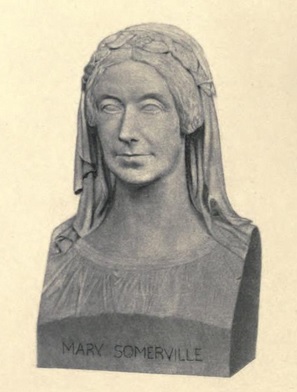
SOURCE: Personal Recollections, From Early Life to Old Age by Mary Somerville [Boston: Roberts, 1874] Featuring cameos by everyone from Garibaldi to Charles Sanders Peirce.